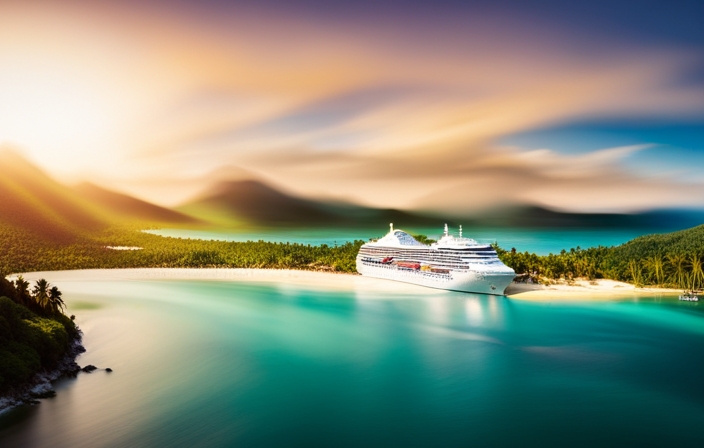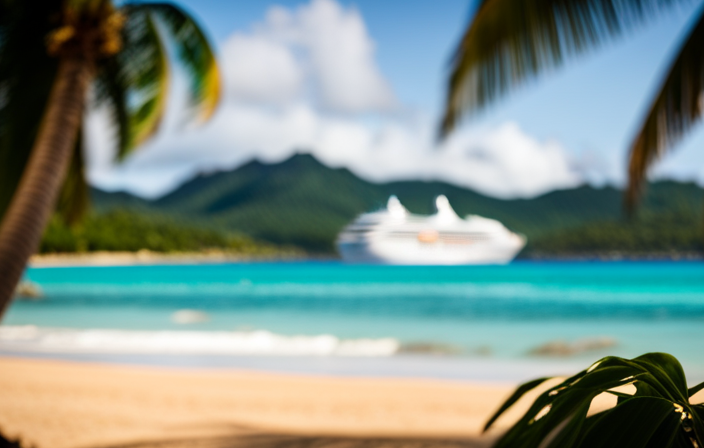Much like a kid in a candy shop, I’m continually on the hunt for the ideal getaway. Throughout my quest, I’ve discovered that cruising provides a thrilling combination of adventure and joy, offering a unique and unparalleled way to explore the globe. Instead of staying at all-inclusive resorts, cruising allows me to immerse myself in different countries and cultures, all without having to move my luggage from one spot. This fits perfectly with my goal to make the most out of every trip. Plus, cruising frequently offers more affordable pricing while delivering tremendous value due to the many included amenities and experiences.
Having been on multiple cruises since I was a toddler, I can confidently say that cruising offers endless possibilities. From studying abroad on a ship to enjoying sea days and meeting different crew members, every moment is filled with excitement and discovery.
So, join me as I delve into the world of cruising versus all-inclusive resorts, comparing experiences, amenities, and sharing my personal journey along the way. Get ready for the ultimate vacation comparison that will have you itching to set sail.
Key Takeaways
- Cruising allows for the opportunity to visit multiple countries and experience different cultures without the hassle of unpacking.
- Cruising is a preferred travel style for those who want to see as much as possible in one trip.
- The cost of cruising is typically cheaper than staying at all-inclusive resorts, offering incredible value for travelers.
- Comparing the amenities and experiences, cruising offers a unique and enjoyable vacation experience over all-inclusive resorts.
Reasons for Preferring Cruising
I prefer cruising over all-inclusive resorts because it allows me to visit multiple countries and immerse myself in different cultures without the hassle of unpacking and repacking.
On a cruise, I can wake up in a new destination every day and explore the local cuisine and traditions. The dining options onboard are diverse, ranging from fine dining restaurants to casual buffets, catering to every taste.
Additionally, the onboard entertainment on a cruise is unbeatable. From Broadway-style shows to live music performances, there’s always something exciting happening on the ship. Whether it’s relaxing by the pool, trying out water sports, or attending a cooking class, the variety of activities ensures that there’s never a dull moment.
Cruising truly offers a unique and enriching vacation experience.
Comparison of Cruising and All-Inclusive Resorts
When considering the options for a dream getaway, it’s like comparing a thrilling adventure with a luxurious retreat. Both cruising and all-inclusive resorts have their own unique charms, but they also come with their own set of pros and cons.
Pros of all-inclusive resorts:
- Everything is included – from accommodation to meals and activities, making budgeting easier.
- Resorts often have stunning beaches and pools, perfect for relaxation and soaking up the sun.
- Spacious rooms with luxurious amenities like king beds, large closets, and dual sinks.
- Adults-only pools offer a peaceful and serene atmosphere for those seeking a more tranquil vacation.
Cons of all-inclusive resorts:
- Limited cultural experiences, as you are confined to the resort’s premises.
- Can be more expensive compared to cruising, especially if you’re a budget traveler.
- Lack of variety in terms of destinations, as you’re restricted to one location.
- Limited opportunities for adventure and exploration, as most activities are within the resort.
Overall, while all-inclusive resorts offer a luxurious and relaxing vacation, cruising provides the opportunity to explore multiple countries and cultures at a lower cost.
Personal Experiences and Preferences
Studying abroad on Semester at Sea allowed me to visit four continents on a ship, providing a unique and immersive travel experience. It was an incredible opportunity to explore different cultures while living on a floating campus. The ship provided a comfortable and convenient way to travel, with spacious cabins, delicious dining options, and a variety of amenities. One aspect that I learned during my time on the ship was the importance of choosing the right bag for a cruise vacation. With limited storage space in the cabins, having a well-organized and compact bag was essential. I found that a versatile backpack with multiple compartments worked best, allowing me to easily access my belongings while exploring various ports of call. Overall, my experience studying abroad on a ship was unforgettable and solidified my love for cruising as a preferred vacation choice.
| Pros of studying abroad on a ship | Cons of studying abroad on a ship |
|---|---|
| Opportunity to visit multiple countries and cultures | Limited space in cabins |
| Immersive travel experience | Limited dining options on the ship |
| Convenient and comfortable way to travel | Limited privacy in shared cabins |
| Access to various amenities | Seasickness can be an issue for some |
Can All-Inclusive Rates and Suite Perks Make Cruising a Better Vacation Option Than All-Inclusive Resorts?
When considering vacation options, cruise inclusions and suite perks can make cruising more enticing than all-inclusive resorts. With all meals, entertainment, and amenities included in the price, along with the added luxury of suite perks like private balconies and butler service, a cruise offers a more comprehensive vacation experience.
Frequently Asked Questions
What are the top destinations for cruising?
When it comes to cruising, some of the top destinations include the Caribbean, Mediterranean, Alaska, and the South Pacific. The best time to go on a cruise depends on the region and your preferences.
What are some popular activities and entertainment options on a cruise ship?
On a cruise ship, there are a variety of nightlife options to choose from, including bars, clubs, and live entertainment shows. Additionally, there are numerous excursion activities available, such as snorkeling, hiking, and city tours.
Are there any age restrictions or limitations for cruising?
Age restrictions for cruising vary by cruise line and destination. Some cruise lines have minimum age requirements for infants, while others have age restrictions for certain activities. However, there are no specific limitations for cruising based solely on age.
What are the dining options like on a cruise ship?
Dining experiences on a cruise ship are diverse and cater to a variety of tastes. From buffet-style dining to specialty restaurants offering gourmet cuisine, there are options to satisfy every palate and enhance the overall vacation experience.
How do I choose the right cruise line for my preferences and interests?
When choosing a cruise line, it’s important to consider your preferences and interests. For example, if you’re a food lover, a cruise line like Celebrity Cruises, known for its culinary offerings, may be a perfect fit.
Alfons is the visionary leader and driving force behind Voyager Info’s success. As the Editor in Chief, he brings a wealth of experience and an unwavering passion for travel to the helm of our cruise-centric platform.
With a lifelong fascination for exploring new horizons, Alfons discovered his love for the ocean and cruising at a young age. From sailing across pristine Caribbean waters to embarking on daring expeditions to far-flung destinations, he has amassed a treasure trove of first-hand experiences in the world of cruising.











